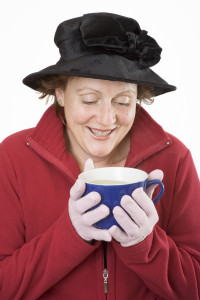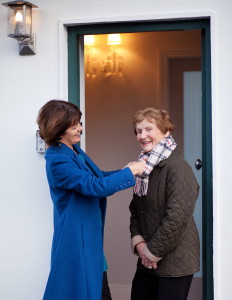 With lots of snow falling, everyone is certainly feeling the cold but winter is surely the hardest for our senior community. They are more at risk in this extreme weather. It can be a difficult time because their bodies, due to their old age, become less efficient at retaining heat; thus, making them more vulnerable and susceptible to serious health problems.
With lots of snow falling, everyone is certainly feeling the cold but winter is surely the hardest for our senior community. They are more at risk in this extreme weather. It can be a difficult time because their bodies, due to their old age, become less efficient at retaining heat; thus, making them more vulnerable and susceptible to serious health problems.
Here are some tips which family caregivers or senior caregivers may do in keeping our elderly safe during these cold weather months:
1. Keep a check on the temperature constantly
This is to know whether to adjust the heater or not. The elderly are particularly susceptible to becoming dangerously chilled because they have less fat, slower circulation and a more sluggish metabolism. A senior can even become hypothermic while indoors, so heating a home is not optional, and should be around 68-74 degrees for the comfort of a senior.
Hypothermia symptoms often develop slowly. Hypothermia symptoms to look out for include shivering, memory loss and slurred speech. A person with hypothermia may also feel drowsy and should get to a hospital immediately.
As a safety measure, it is better to have the temperature monitored.
2. Watch out for ice and snow
Falls and other accidents are common as the temperature drops. Sidewalks slick with ice and snow pose a serious falling hazard for an elderly person. In addition, keeping people with dementia safe is a tough job too. It’s frightening because they can’t go out, they don’t realize they can’t go out, it’s slippery, it’s icy. Make sure that the porch, driveway, sidewalk, etc. of the senior has been thoroughly cleaned. To maximize a senior’s stability, be sure that they have rubber-soled shoes and new treads on their walker or cane.
3. Make sure they have a nutritious diet and are hydrated
Proper diet will help protect our seniors against excessive cold. Hot foods like soups, baked potatoes and chillies are good choices during this kind of weather.
Seniors are also prone to becoming dehydrated simply because they eat and drink less than younger people, thus they consume less water. In general, people also feel less thirsty during the winter and so are more prone to not drinking enough as they should. Make sure your elderly loved one is drinking consistently. Dehydration affects our body’s ability to regulate body heat and increases the risk of frostbite. Thus, replenishing our body with water is highly advisable.
4. Keep them covered in warm clothing
Even when an elderly person is indoors, they should be dressed in warm layers so they can take clothes off if they are too hot, or put more on if they are too cold. Mittens, scarves, sweaters, hats, and coats are a few of the must-have articles of clothing for seniors living in colder temperatures. Also, clothes made of wool, silk or polypropylene will hold more body heat than clothes made of cotton. A blanket should also be kept handy and fleece slippers can be worn around the house to keep warm.
5. Prepare Well for an emergency
Winter storms can mean power outages and resultant loss of heat, water and telephone services. Inclement weather can mean difficulty going out for necessary supplies. Prepare them for emergencies - Stock up on food and fresh water. Some Meals on Wheels programs provide frozen emergency food packs that can be heated on days when there is no delivery. The disaster kit should also include a few days-worth of medication for the senior, a flashlight, a weather radio, extra batteries, blankets and first-aid essentials.
By preparing a senior’s home for the winter months and taking the necessary safety precautions, we can reduce the risk of weather-related problems.
Nothing will keep them more warmed than the warmth given by their friends and families. By spending time with them, making them laugh and keeping them company will surely chase all their coldness away.
If you know of any seniors who are unable, for any reason, to prepare for extreme cold-weather conditions, make sure they avail shelter facilities.


Leave a Reply